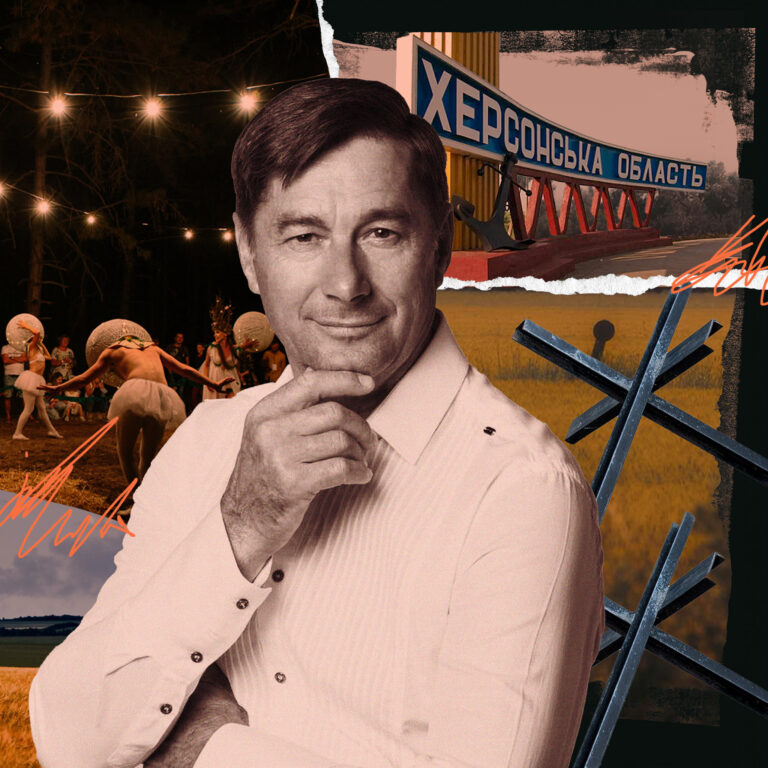
The voices of occupation – a series of stories from people who lived under occupation and managed to get out.
Our next hero is Oleksandr Knyha, a deputy of the Kherson regional state administration and theatre director. He and his family managed to evacuate from the town of Oleshky, near Kherson, after being arrested and interrogated by Russian soldiers.
Oleksandr Knyha is the director general and artistic director of Kherson’s M.H. Kulish Regional Academic Music and Drama Theatre, the founder of the Melpomene of Tavria annual international theatre festival. Oleksandr lived in the town of Oleshky, near Kherson. For more than 20 years he had been organizing the festival, which featured theatre companies from Kherson, as well as from other Ukrainian and foreign cities. In 2022, the festival was not held in its usual format because of Russia’s full-scale invasion, but Ukrainians from other cities and people all around the world supported Oleksandr and joined him in organizing the event.
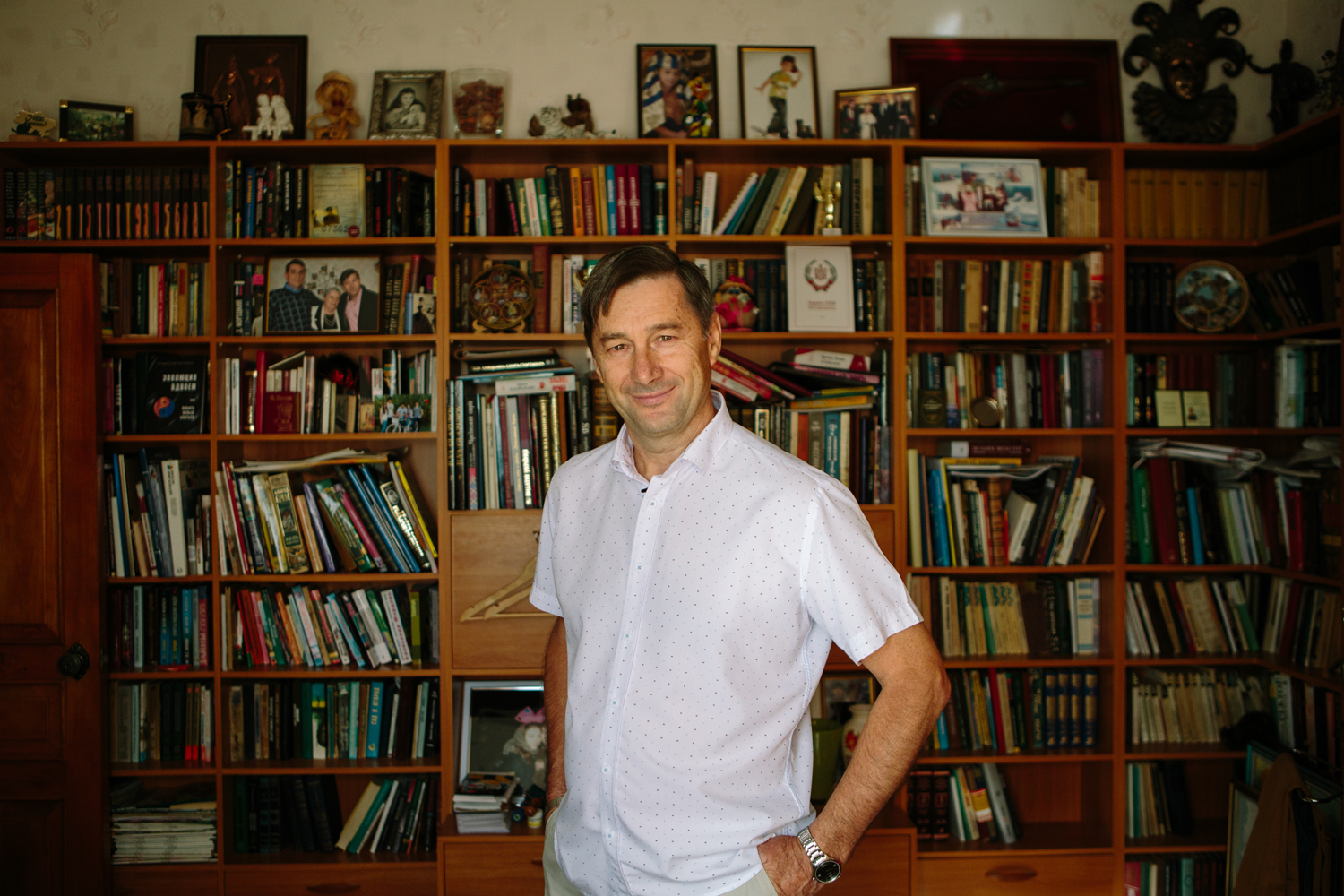
Photo: Iryna Hromotska
“Dad, it’s started”
— It wasn’t so much the explosions that woke us up, but rather the phone calls. My son lived very close to a military base; he heard an explosion, called me and said: “Dad, it’s started”. We got a hold of ourselves and got dressed; I went to the shop with my elder son, we bought food, filled up on petrol, and brought it all home.
I went to work in Kherson, at the theatre, via the Antonivskyi Bridge over the Dnipro River. I gathered the staff on duty and told them: “It’s happening. Set up bomb shelters, get everything ready, check the electricity, so that people can come to the theatre and hide here”. At about 1pm, I was already on my way to Oleshky. I drove onto the bridge, and right at that moment, my friend called me and said: “I beg you, go back, the tanks are already in Oleshky”. And we saw that the traffic was only on the right-hand side of the bridge – the left-hand side was empty (in Ukraine, motorists drive on the right – ed.). The driver and I were trying to move forward slowly but surely, bypassing the other cars, and then we realized that the traffic jam was getting worse. I thought: “We have to go back; otherwise we’ll get stuck, and then we’ll have to stay here”. Just as we were turning around, helicopters flew overhead and shelling began. Russian paratroopers were landing. We escaped from the bridge to the sound of explosions, and went back to Kherson again. I got to Oleshky by rowboat, steered by an acquaintance of mine. While we were landing on the shore, there was a fight on the bridge: planes, rockets and projectiles were flying. That was how the war started for us. When we got home, we started getting the basement ready; that’s where we slept for the first two weeks.There were 11 people in our building, then another friend joined us.
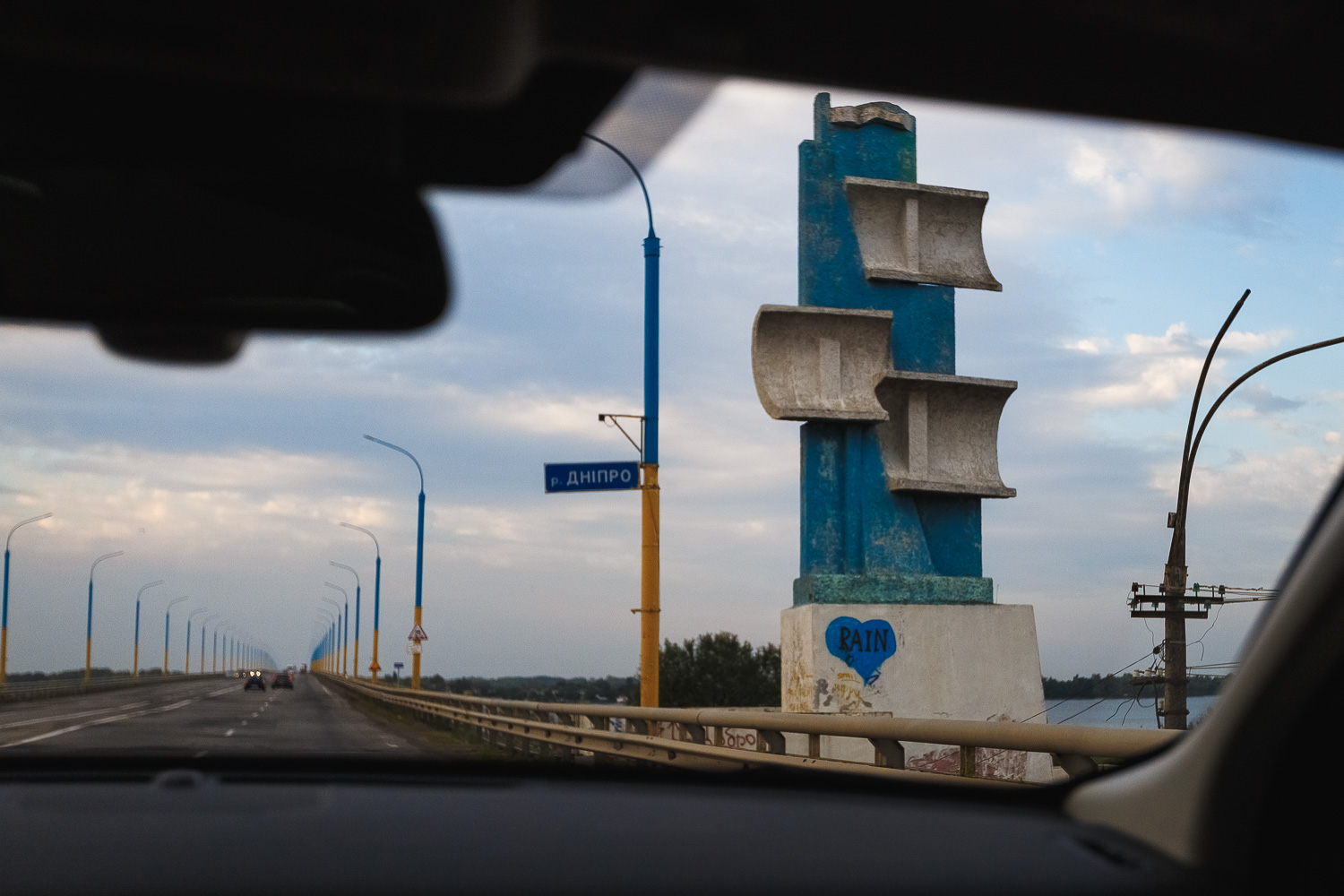
Photo: Juriy Stefanyak
Interestingly, Russians couldn’t get to Oleshky all that time because their maps showed the old name of the town, Tsiurupynsk (this was its name until 2016 – ed.). And then at night we removed the sign, when the guys got organized. They gathered literally on the third day. We decided to patrol the streets because there weren’t any police. Some people left immediately; the houses were empty. Those who stayed there are still going out and patrolling the streets at night.
We had the territorial defence forces. Before the war I went there to enroll, but at the draft board they asked my age (I’m 63) and I was sent away. However, Russian troops were seizing territories so fast that all the territorial defence battalions were guarding Kherson. The invaders didn’t enter the city at once, not on the first day. It was the same in Oleshky, but the Russians “skipped” our town; we didn’t even see them.
When the war started, regional deputies met for an online session, at which they adopted a resolution that the city of Kherson, and the Kherson region, are Ukraine, and that no pseudo-republics would ever be created. I tried to go to Kherson, but everybody told me I could be arrested at the checkpoints between the city and Oleshky: Russian troops had a list of deputies and activists.
My theatre people took part in the rallies. The first rallies in Kherson started on March 2-3. We organized an event like this on the central square in Oleshky too, but we didn’t even expect such a large number of people. It was such incredible unity. Then, when we came home and I was arrested, the main claim was specifically related exactly to the rallies, as if I had given people money to participate. According to the Russian troops, I was the main activist who financed this campaign. I tried to explain to them that our people were used to expressing their opinions freely, but it was hard for Russians to understand this.
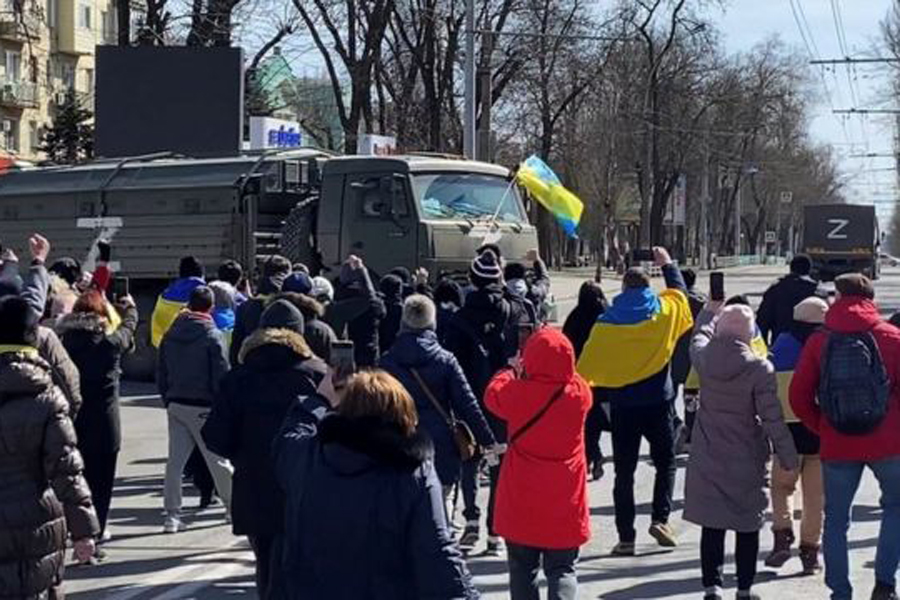
Photo: Reuters
The arrest
We live on the street near a forest, in a quiet place, so trucks don’t pass by. Usually I get up before everyone else (at that time, six people were staying at the house). I looked out the window and saw a lot of armed people and a huge armoured troop carrier, on top of which there was a turret with a machine gun, and that machine gun was pointing right at our windows. Then I realized that they had come to us. They started to knock, opened the door and asked if Knyha lived there, and ordered everyone to get out of the house. As it turned out later, the whole yard was surrounded: three armoured cas, blocked streets, snipers in the unfinished building next door, ten civilian cars, black jeeps with the letter Z. It all looked like a movie, a blockbuster; I felt a bit like Osama bin Laden.
(міжнародним терористом. — ред.).
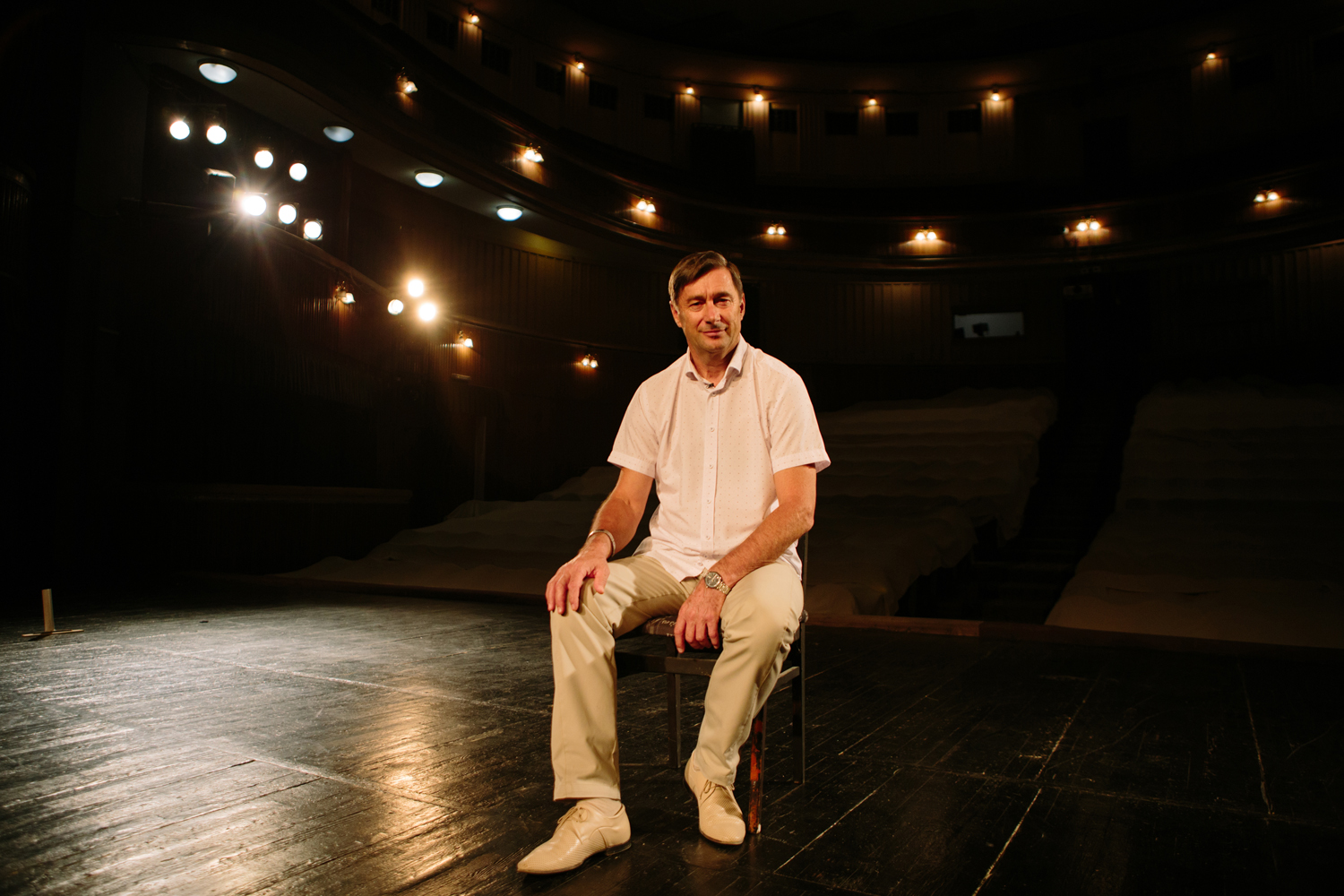
Фото: Іринка Громоцька.
I was the first one to be brought into the house, followed by three armed men: the one in the middle with a gun shield and two on the sides with assault rifles. I went ahead and said: “Come in, don’t be afraid, there’s no one in the house”. “Go in and be quiet, open the door, right, left”, they answered in Russian. We went through the whole house like this. They led me to my home office with the words: “Now we can talk to you”.They didn’t beat me; one of them stepped on my foot, got closer to my face and said: “Everything depends on how you answer. If you give the right answer, everything will be fine”. At the same time, the others were searching my house, turning all the rooms upside down, asking my wife if they would need to rip out the parquet flooring. One of the soldiers was standing there with a very angry expression on his face, looking at me all the time, and trying to catch my eye, while the other was in a different uniform – he was probably from the FSB (Federal Security Service of the Russian Federation – ed.). They asked about the rally, about money, about nothing in particular. Then I was taken away and thrown into a car; they told my wife to pack my things, and I was driven to Kherson. And so it was that on March 23, after almost a month of the war, I got to the city, but with a very particular kind of escort.
Something interesting: in the car (it might have been Ukrainian car, that they stole) the radio was playing, and the song “Bayraktar” came on. And they also were singing along to it and saying: “You Ukrainians have written so many patriotic songs.” I replied: “That’s the way we are – we’re a singing nation.” They said: “You call us orcs, but you have a lot of swearing in your songs.” “What a time, what a song.”
It was scary being thrown into a prison cell for the first time, where there was nothing. A bare cell, and through the small window I could see Buryats (an ethnic group from Buryatia – ed.), all wearing masks, but I could see that their eyes were Asian, not Slavic. One of them said: “If you behave, we’ll feed you”. They led me to a room (at that time I had a hat over my eyes, a strange hat with a terrible smell) and sat me down on a chair. There was a strong smell of alcohol. I thought they were going to give me an injection, but they did a drug test. Then they took my fingerprints and removed the hat to take photos from the left and the right, like a criminal. After all this, they led me to another room and so began a long conversation about how they had come to “liberate” us, and that they’d be here a long time.
Then, in the evening I was released, about half past six, because it was already getting dark when I was interrogated in the office (the news about Oleksandr’s abduction and interrogation caused a great public outcry that could have influenced the occupiers’ decision to release him quickly — ed.). I told them I could go to the theatre. They drove me there, dropped me on the street with the hat over my head, and told me to count to ten before taking it off. It turned out that I was standing near the Textile workers’ palace of culture, which was far away from the theatre, and there was 40 minutes to go until the curfew. I remembered that some people I knew lived nearby, but I didn’t know their address. In a panic, I still managed to find them and enter their building.
Then the occupants invited me to a conversation. Three men dressed in civilian clothes came to the theatre; they also announced that they had already restored order in Donetsk, and that now they were going to restore order in Kherson. They said: “You’re the deputy here, so get to work”.
The evacuation
Nobody of sane mind could fathom how today, in the 21st century, it was possible to come straight in with tanks. What for? We had to get out of there. My friends called and told me that the police were going to evacuate their families, so we could contact them. We made arrangements, but when we got to the meeting point we saw about a thousand cars there. All of them were covered with signs bearing the word “children” and hung with white cloths. We only just managed to find those people, and our journey began. At the first checkpoint, we waited for more than two and a half hours just to leave Kherson. At the second one it was very scary because the soldiers there took our documents into their booth. Then I told my family to go without me, not to stop, if I was detained. It turned out that they were just establishing who was going where. We were heading to the towns of Beryslav and Kakhovka; the route in the opposite direction, from the city of Mykolaiv, took almost seven and a half hours. After the town of Snihurivka we saw Ukrainian soldiers. Then it got easier. We got from the town of Bashtanka to Mykolaiv; there, we decided to go all the way to Odesa before the curfew.
We had been living under occupation for 40 days. There was no food, no medicine, nothing. And when we went to the supermarket in Odesa to buy something for dinner, it was so strange for us to see food on the shelves. My family and I were walking around as if it was a museum. Then our friends from Lviv invited us to stay with them, so we got to Lviv in stages, via the city of Khmelnytskyi.
A festival dedicated to the people of Kherson
As soon as we recovered, in two days I got the Lviv theatre community together and asked them for help. We scheduled the festival (Melpomene of Tavria, an international theatre festival normally held in Kherson — ed.) for June 10 , and devised a new format. Every theatre company had to perform in its home city or home country, yet on the general programme they had to talk about Kherson and its people. Because when I go for a walk in the streets of Lviv in the morning or evening, the cafes are full of people, everyone is sitting, music is playing, and it feels like the war doesn’t exist. But it does, the cruel war is going on.

We managed to put on a large-scale festival. I’m thankful to every friend, every Ukrainian theatre company, every foreign theatre company, and everyone who was in Kherson — they all seized on the idea. 64 theatre companies from 34 Ukrainian cities and from 11 different countries took part. For the entire ten days (from 10 to 19 June — ed.) they were performing plays, inviting internally displaced people (especially those from Kherson), talking about the people of Kherson, and where possible, collecting money to support them. In France, Japan and the USA, entire campaigns were dedicated to Ukraine and the Kherson region. This is how our girl ‘Melpomene’ woke up the whole world to get our voice heard. We named the festival ‘Melpomene of Tavria: the voice of the Kherson region’. In Lviv, every local theatre participated: plays were performed on the stages of the Lviv Opera, the Maria Zankovetska Theatre, the Lesya Ukrainka Theatre, the Puppet Theatre, and all the others.

How the occupied south of Ukraine lives
Today I see that all of Ukraine is suffering from the Kherson region being cut off: from the absence of early vegetables and fruits, our strawberries, tomatoes, and cucumbers. You can feel it here, you can feel it from the prices. And there it costs nothing at all, Russians buy it all up and take it to occupied Crimea. And their media is showing how good it is to live in Crimea now that the Kherson region is under their control. They have started to bring products from the peninsula to the Kherson region; food has appeared in the shops, but people don’t have any money, they don’t have cash. The Russian media says that in the temporarily occupied region, Russian soldiers were giving out food and money, trying to bribe people, but in fact, rubles are not used there: no one wants to take their money. People are already bartering, because products are very expensive. For example, if baby food used to cost up to 200 hryvnias, today you have to pay 700. There is no income, no work – nothing to survive on. It’s very difficult.

Today (from May 28 — ed.) it is impossible to get out of there (Kherson — ed.) and into the Ukrainian-controlled territory of the region. The occupiers have blocked absolutely everything; there is fighting near the village of Stanislav; towards Snihurivka, our military is also liberating territory, there is an offensive going on, so you can’t get out (the conversation with Oleksandr was recorded on June 9 — ed.). Now the only way out is to Crimea, but there are queues of cars. Men have no way to leave at all; Russians take them to the filtration camps.
The scariest thing is the feeling that you have been abandoned. However, because of the ‘thunder’ near Kherson every night, we understood that the army was resisting. And we believed. People are suffering from the information blockade most of all. When Ukrainians break free from occupation, you have to explain to them that here nobody has forgotten about them; here, people are trying to solve the problem with their salaries*; here, people are shouting about Kherson. There, people can’t hear it; they think that they have been abandoned, and this despair gives the occupiers the opportunity to attract them to their side.
*The Ukrainian government is trying to find ways to pay salaries to its citizens who live in temporarily occupied territories.
To those who are under occupation now: I beg you to hold on and believe that liberation will definitely come. This cannot happen – some stranger coming and taking your home by force, taking your territory. This is why the whole world has risen up; this is why Ukrainians must not calm down now, not until our territories are free.

